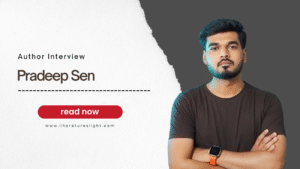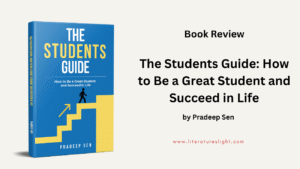Book: An Introductory Book of Diraasat-ul-Islam
Genre: Poetry
Biographical Info: Fardun Ali Middya is a young author, artist & religious speaker from India. He had written a book on Comparative Religion Studies prior to “Diraasat-ul- Islam”. He had also won 258 awards all over the world, “Golden+ & Diamond Artist” title from Picasso Art Contest, USA by his artistic works. He has got also some experience about global politics after participating in several MUNs and was honored as “Honourable Mention” in one of them. His book “Mentions of Prophet Muhammad” is a comparative religion study on Prophet Muhammad (pbuh) which he wrote earlier. Now he is writing this new book named “Diraasat-ul- Islam” (study of Islam) which will help you to understand Islam and its thoughts. He was honored as India’s One of the Top 100 debut authors on 15th May 2019 by Literatureslight for the book “Mentions of Prophet Muhammad”.
Interviewer: Many congratulations on your wonderful book ‘An Introductory Book of Diraasat-ul-Islam: A comparative study on Islam’, Fardun! How do you feel about it? Tell us something about your book?
Fardun Ali Middya: Alhamdulillahi wa salatu as-Salaam ala- Rasulillah wa ala- Aalihi wa Ashaabihi Ajma’een. It is a duty upon every knowledgeable person to spread that knowledge to their next generations. By acknowledging this duty, I am glad to be a part of those for whom Allah says in the Qur’an,
شَهِدَ اللَّهُ أَنَّهُ لَا إِلَٰهَ إِلَّا هُوَ وَالْمَلَائِكَةُ وَأُولُو الْعِلْمِ قَائِمًا بِالْقِسْطِ ۚ لَا إِلَٰهَ إِلَّا هُوَ الْعَزِيزُ الْحَكِيمُ
“Allah witnesses that there is no deity except Him, and [so do] the angels and those of knowledge – [that He is] maintaining [creation] in justice. There is no deity except Him, the Exalted in Might, the Wise.” (Al Qur’an 3:18)
May Allah accept from us.
The book is all about clarifying the basic concepts of Islamic faith in the light of Qur’an, Sunnah, Science and comparative religious texts from various religions in the world. The book begins by talking about the origin of human species and proves that every human being present in this world are from the same family of Adam and Eve. Then the book tries to clarify about the basic tenets of a true religion and helps the reader to clarify his/her vision about religions in this world. The book is mainly written for non-Muslims and Muslims who wanted to authenticate their faith and give answers to the questions which were disturbing their minds from a long time. The third chapter is all about answering the critical questions by mentioning real facts. The questions were raised by non-Muslims and even some liberal classes to dilute the honour of Islam. The fourth and fifth chapter is mainly for Muslims to build up their basic faith in the light of Qur’an and Sunnah. Over all its an introductory book of Diraasat-ul-Islam which is under process.
Interviewer: Tell us more about Islam, what are the foundational sources of Islamic beliefs and practices? Be descriptive please so that our visitors know about your thoughts a little more.
Fardun Ali Middya: Islam means to submit yourself to that one and only Almighty God of this universe. It is the religion which Allah has defined for the whole humanity as their true guidance. The main thing in Islam is monotheism and following that only one God’s commands. This monotheistic concept gives Islam a timeless past and a limitless future. Islam is the nature of every creation created by Allah. As an example, a bird worships Allah by spreading its wings in the air (Surah Mulk; Al Qur’an). It is in human nature that a human mind tries to find answers to his/her questions. Who is God, how and why he had created us? What to do in our life? And so on. Islam is the only and the oldest religion ever which is guiding human being in every aspect of their lives. It is the only divine path which can be claimed to be from God logically, scientifically and historically. For further information about Islam’s journey from the time of Adam till now, read my book’s (An Introductory Book of Diraasat-ul-Islam) first chapter ‘Evaluation of religions and the first human’. However, Islam is the way of life which God himself wants to be followed by the whole humanity. So, Allah sent Prophets and Messengers by the time through the ages to teach mankind the true covenant of Allah Almighty. And Allah completed his guidance upon his last Prophet, Muhammad bin Abdullah (pbuh). Allah had sent down Qur’an as a testifier of the previous covenants and as the seal of Islam and the straight path, the final covenant of God towards the mankind and jinn kind. Allah says in the Qur’an, ا
ِنَّ الدِّيْنَ عِنْدَ اللّٰهِ الْاِسْلَامُ وَمَا اخْتَلَفَ الَّذِيْنَ اُوْتُوا الْكِتٰبَ اِلَّا مِنْۢ بَعْدِ مَا جَاۗءَھُمُ الْعِلْمُ بَغْيًۢا بَيْنَھُمْ وَمَنْ يَّكْفُرْ بِاٰيٰتِ اللّٰهِ فَاِنَّ اللّٰهَ سَرِيْعُ الْحِسَابِ
Indeed, the religion in the sight of Allah is Islam. And those who were given the Scripture did not differ except after knowledge had come to them – out of jealous animosity between themselves. And whoever disbelieves in the verses of Allah, then indeed, Allah is swift in [taking] account. (Al Qur’an)
*For further clarification see “An Introductory Book of Diraasat-ul-Islam: A comparative study on Islam”, page no. 1-52.
The foundational sources of Islamic belief and practices are Qur’an and Sunnah (traditions of Prophet). The 7 mainstream books of Sunnah are Sahih Al Bukhari, Sahih al Muslim, Musnad Ahmad bin Hanbal, Sunan Abu Dawood, Sunan an Nasai (kubra), Sunan at Tirmidhi and Sunan Ibn Maajah. There are also other books on Sunnah like Muwatta Imam Maalik, Mustadrak lil Haakim, Mu’jimul Kabir tabarani, majmaa’uz zawaed, Musannaf ibn Abee Shaibah, Mussanaf Abdur Razzak, Musnad Abu Yaala, Sunan an Nasai al sugra, Dalail un Nubuwah by Imam Bayhaqi, Sunan al Bayhaqi, etc. Among all of these books of Sunnah, Bukhari and Muslim are called Sahihain or Shaykhain for their utmost authenticity. For modern problem solving there are two methods to find the solution from Qur’an and Sunnah if it is not directly mentioned there. These are Ijma’ (agreement of the whole Muslim ummah) and Qiyaas (extracting the theme of the problems from the Qur’an and Sunnah and provide solutions based upon them).
Interviewer: What was the inspiration for the book?
Fardun Ali Middya: The 8th and 9th century scholars of Islam and their works, biographies had inspired me to be the truth lover and spread the knowledge of Islam intellectually. One of them was Imam Maalik (rh) who was the first to collect the narrations of Prophet Muhammad (pbuh) in one book. And also, Imam Muslim (rh) who collected one of the most authentic collection of Sunnah for Muslim ummah. Some modern scholars like Muhammad Ali Mirza, Dr Zakir, Dr Israr Ahmed has also inspired me to do so.
Interviewer: What is your schedule like when you’re writing a book?
Fardun Ali Middya: Literally I have no fixed schedule. Whenever I want to note something, I just open my diary and write it down. By the time I start research about what I am willing to include in my book.
Interviewer: What kind of research do you do, and how long do you spend researching before beginning a book?
Fardun Ali Middya: I mainly take Qur’an, the mainstream books of Ahl-as-Sunnah (Bukhari, Muslim, Tirmidhi, Abu Dawood, An Nasai, Ibn Majah, Musnad Ahmad) and so on other secondary books like Mishkat, Bulugh al Maram etc. for research on various topics. For modern analysis I take support from various authentic sites of google like Wikipedia, Islam101, IOU, islamqa etc. For further explanations I listen to various scholars like Mufti Menk, Engineer Muhammad Ali Mirza, Dr Bilaal Philips, Dr Idrees Zubair, Dr Zakir and so on for research purpose before writing a book. The research continuous until I become satisfied which I have written for the reader. This book took almost 4 years to be completed.
Interviewer: How many books have you written? Where can the readers find them?
Fardun Ali Middya: I have written two books until now, first one is ‘Mentions of Prophet Muhammad: peace be upon him and his family’ published by Educreation publishing and the second one is ‘An Introductory Book of Diraasat-ul-Islam: A comparative study on Islam’ published by Literatureslight publishing. Both are available on Amazon (paperback and kindle edition) and Google play store (eBook) as well as on the official stores of respective publications.
Interviewer: Who is your favourite author and why?
Fardun Ali Middya: My favourite author was an 9th century hadith scholar called Abu al Husayn Asakir ad Din Muslim ibn Hajjaj ibn Muslim ibn Ward ibn Kawshadh al Qushayri an Naysaburi (rh) (815-875 CE) or Imam Muslim (rh), who collected Sahih al Muslim which is one of the two most authentic collections, alongside Sahih al-Bukhari. His love for authenticity and truth was uncountable. Ibn Abee Hatim said that Imam Muslim was trustworthy, one of the hadith masters with knowledge of hadith. He is my favourite author because he was too much sensitive in the issue of authenticity in religion. Which is one of his great specialities. And this is the thing which I prefer the most in my works.
Interviewer: Favourite quote –
Fardun Ali Middya: Allah quotes in his book (Al Qur’an), يَغْفِرُ الذُّنُوْبَ جَمِيْعًا ۭ اِنَّهٗ هُوَ الْغَفُوْرُ الرَّحِيْمُ Say, “O My servants who have transgressed against themselves [by sinning], do not despair of the mercy of Allah. Indeed, Allah forgives all sins (For those who repent and correct themselves). Indeed, it is He who is the Forgiving, the Merciful.” (Al Qur’an 39:53)
Interviewer: Any message for readers regarding the book?
Fardun Ali Middya: One thing to say,
Dear readers,
I respect your thoughts, your beliefs, your philosophy. Every human being has their rights to be what they are. But the truth is only one and its always crystal clear if you do authentic research. So, sit down, take a deep breath and start reading regardless of what you are or from where you belong. Indeed, you are one of the children of Adam. And Allah says,
وَلَقَدْ كَرَّمْنَا بَنِيْٓ اٰدَمَ وَحَمَلْنٰهُمْ فِي الْبَرِّ وَالْبَحْرِ وَرَزَقْنٰهُمْ مِّنَ الطَّيِّبٰتِ وَفَضَّلْنٰهُمْ عَلٰي كَثِيْرٍ مِّمَّنْ خَلَقْنَا تَفْضِيْلًا
“And We have certainly honoured the children of Adam and carried them on the land and sea and provided for them of the good things and preferred them over much of what We have created, with [definite] preference.” (Al Qur’an 17:70)
Interviewer: Thanks for your time! It was a pleasure talking to you. I wish you best of luck for the future!
Fardun Ali Middya: It’s my honour, Thank you so much.
Wa ma Alayna Illal Balagh.
Order on Amazon: ‘An Introductory Book of Diraasat-ul-Islam’.






